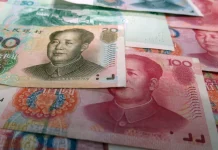 China’s lottery industry has reported sales of CNY10.51bn (£1.20bn/€1.37bn/$1.49bn) for March, a vast improvement on February’s CNY1.3m, though this represents a 69.9% year-on-year decline.
China’s lottery industry has reported sales of CNY10.51bn (£1.20bn/€1.37bn/$1.49bn) for March, a vast improvement on February’s CNY1.3m, though this represents a 69.9% year-on-year decline.The country is in the process of recovering after being hit by the novel coronavirus (Covid-19) pandemic, and the majority of provinces resumed lottery sales in April. However the Beijing Sports and Welfare Lotteries only resumed from 6 May, the final province to do so.
For March, Welfare Lottery sales accounted for CNY5.18bn of the total, down 68.7% from the prior year, with Sports Lottery sales contributing CNY5.33bnm down 71.0%.
Across both lotteries, digital sales accounted for CNY8.71bn of the total, down 52.7%, while quiz-based games contributed CNY768m, down 91.8%. Instant win games, meanwhile, saw sales drop 57.3% to CNY1.03bn, while there were no video lottery sales reported, in the period.
Keno, usually the lowest source of income before the video lottery wipe-out, saw sales decline 89.6% to CNY1.6m.
While sales across all provinces declined, the Chinese Ministry of Finance noted the biggest declines were seen in Guangdong, Shandong, Jiangsu, Zhejiang and Hubei, ranging from a CNY2.662bn decline in Guangdong, to a CNY1.58bn fall in Hubei sales.
The disruption caused by Covid-19 also resulted in a significant year-on-year decline in sales for the first quarter of 2020.
For the three months ended 31 March, sales across the Sports and Welfare Lotteries were down 64.5% at CNY37.72bn. The Welfare Lottery accounted for CNY18.07bn of this total (down 63.2%), while Sports Lottery sales fell 65.7% to CNY19.65bn.
Digital lottery sales made up the bulk of the quarterly total, at CNY23.68bn, down 57.0%, while quiz game sales fell 76.7% to CNY7.57bn.
Instant win sales declined 40.4% to CNY2.58bn, with video lottery sales down 78.7% at CNY2.65bn. Keno sales contributed the final CNY11m.












